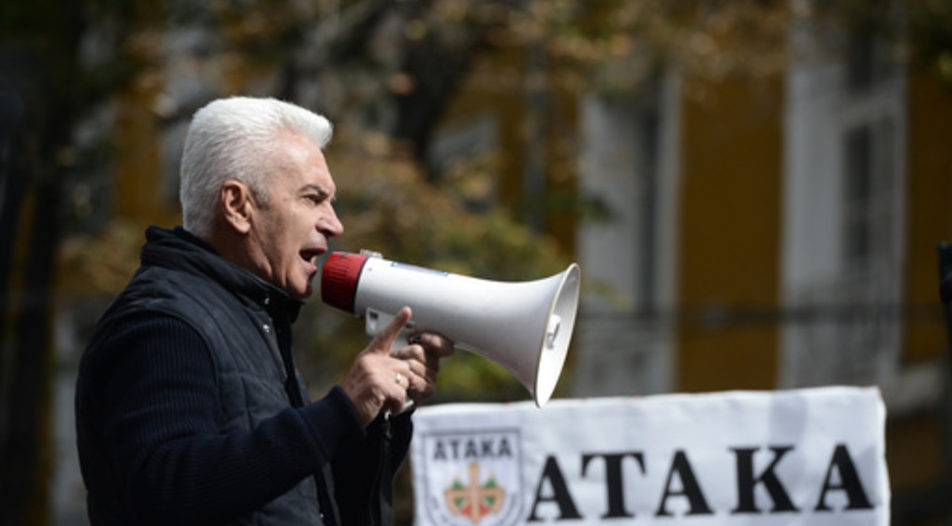Byala Zlatka
Volen Siderov, a master survivorA Bulgarian nationalist who can enter any coalition, lambast any partner, cause endless scandals, and still survive and thrive, against all odds.
Certain Bulgarian politicians manage to weather any amount of controversy and even thrive in the current public environment. But the most conspicuous of all must be Volen Siderov. The leader of Bulgaria's ultranationalist and xenophobic party - Ataka (meaning "attack" in Bulgarian) - has caused so much uproar throughout his 15-year political career that it is difficult to know where to begin.
He has acquired many nicknames over the years. There was "the golden finger" - designating his party's crucial support for the short-lived coalition government of the Bulgarian Socialist Party (BSP) and the Movement of Rights and Freedoms (MRF) in 2013-2014. Another was "the Fuhrer" for his eloquent imitation of Nazi leader Adolf Hitler in his early years. Yet one stands out from the rest. It is "Byala Zlatka", which refers both to the pine marten, a small carnivorous mammal and the nickname of ex-Playmate model Zlatka Raykova. Mr Siderov is so-called on account of his eponymous white hair and his cunning, Machiavellian manoeuvrings, which resemble the way both the marten and the ex-Playmate survive in their respective jungles.
Mr Siderov is a political survivor who, despite five convictions for hooliganism and having entered coalitions with most of the main political parties over the past 15 years, still passes for an outsider and an anti-systemic player in supporters' eyes. In 2016, he joined the rising ultranationalist coalition, the United Patriots, which soon mustered enough far-right votes to enter a coalition with GERB, just to become a de facto internal opposition to his own nationalist coalition partners. But wait, there is more! Just when they decided to get rid of him, he entered the mayoral race in Sofia in 2019. He promptly "accused" his nationalist opponent (and ex-coalition partner) Angel Dzhambazki from VMRO of being homosexual, and won a key seat in the Sofia Municipal Council, where he would act as a "golden finger" once again - this time around, in GERB's favour. What a politico!
Glavanak
Bad hombresPrime Minister Boyko Borissov used the unusual term to shame those responsible for taking a well-known radio host off the air.
"Glavanatsi, glavanatsi is the right word. I think they are doing this on purpose," said Prime Minister Boyko Borissov to reporters at the end of September when asked for his reaction to justice reporter Sylvia Velikova being taken off the air at Bulgarian National Radio (BNR). The attempt by a still unknown entity (at least officially) to dispose of Ms Velikova, a famous and respected reporter with a critical stance towards recent developments in the judicial system, caused the biggest backlash in the media guild in Bulgaria's living memory. And it inspired Mr Borissov to introduce into popular use a new offensive term - "glavanak" (the singular of glavanatsi).
Actually, it would be fairer to say that the prime minister re-introduced the term, after first using it in 2016 to point the finger at criminal gangs involved in a firefight in a busy bar in Sunny Beach, which Mr Borissov saw as an attempt to sabotage the summer seaside tourist season. "We won't sacrifice the millions of tourists and the billions of levs our tourist industry expects because of a few glavanatsi," the prime minister said, promising "a total repression, a legal one at that" against these criminal gangs that jeopardized the summer resorts.
A few theories abound about the meaning of the word, which is outside regular Bulgarian dictionaries. One is that it refers to the common bullhead, a freshwater fish also known as the miller's thumb and freshwater sculpin that is notable for its large broad head and tapering body. The other, simpler version, is that "glavanak" refers to an archaic variation of the word peasant, which carries a diminutive connotation in Bulgarian.
While it is clear what Mr Borissov meant with the term, it is not very clear what happened to the "glavanatsi" in both cases. Neither the media regulator, nor the State Prosecution, found out who ordered Ms Velikova's removal from the air in September. As for the gangsters who exchanged fire in a bar packed with foreign tourists in 2016, only three out of 19 people arrested after the shootout got indictments. Three years later, they are still not convicted.
Bay Ganyo
The eponymous BulgarianThe visit of the Bulgarian government delegation to Washington, DC in November caused some tongue-in-cheek parallels with a famous Bulgarian literary character.
The press conference after the meeting between Prime Minister Boyko Borissov and US President Donald Trump on November 25 failed to produce much anticipated quality one-liners. US journalists were, perhaps understandably, more interested in asking about the impeachment proceedings against Mr Trump. Their Bulgarian colleagues, on the other hand, merely asked when Sofia would be included on a visa-free travel list. Despite that, the Bulgarian meme-sphere got a field day by mocking some in the Bulgarian delegation for their close resemblance to the classic Bulgarian literary character Bay Ganyo.
Invented by 19th-century author and politician Aleko Konstantinov, Bay Ganyo is considered to be the stereotypical "Average Joe" of the Balkans, if the same Mr Joe were an ignorant, self-centred opportunist, a lower-middle-class anti-hero who is proud of his provincial habits. While Bay Ganyo's image has long been looked down upon by Bulgarians, many people cannot help but resemble his contours that have been so vividly depicted by Konstantinov over a century ago.
The latest victims of this uncanny resemblance were high-ranking officials visiting the US. Defence Minister Krassimir Karakachanov became the first victim because of how he disembarked from the plane before the welcoming committee, wearing blue jeans and carrying a travel suitcase. His image, in stark contrast to the formal attire of the rest of the delegation, blew the Bulgarian section of Facebook, which was instantly reminded of the classical anti-hero. A photo-shopped version of the image that saw him carrying a Billa-branded supermarket bag even made it to Slavorum, one of the biggest Slavic meme pages.
Then came the turn of Prime Minister Boyko Borissov who got flak for saying that "we are as close to the Republicans as we are to the Democrats," after meeting representatives of both the big US parties. He later added that the two parties can fight all they want, but they both can consider Bulgaria as a friend. Mr Borissov is probably right to be diplomatic in his own way, but the two quotes reminded observers of the classical Bay Ganyo phrase "Is Your highness Conservative or a Liberal if you ask me, I can't understand either - it is business, after all. And you know, I understand these things" which described his non-ideological, but an opportunistic view of politics.












